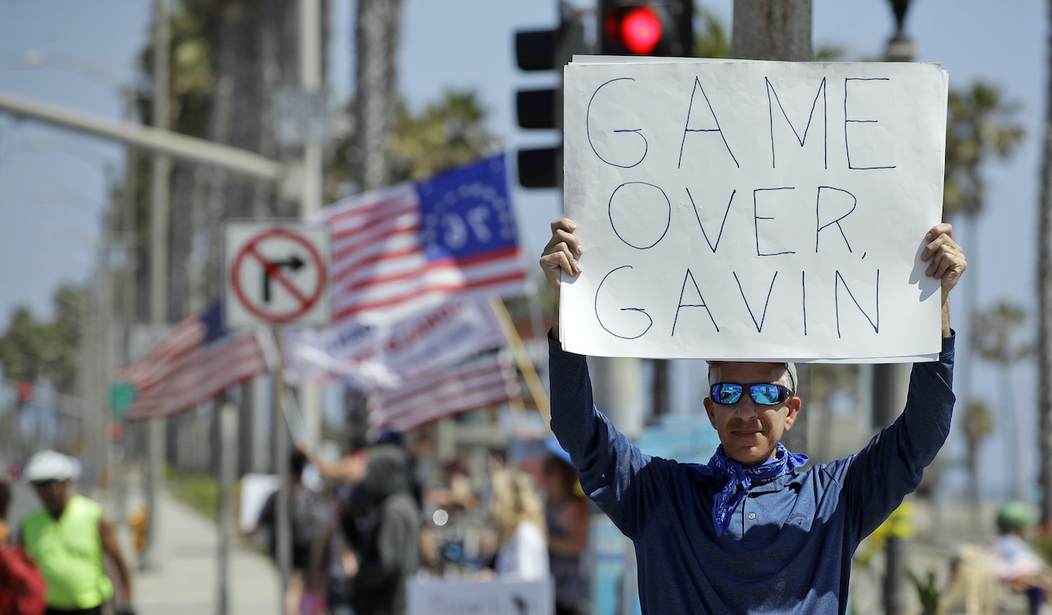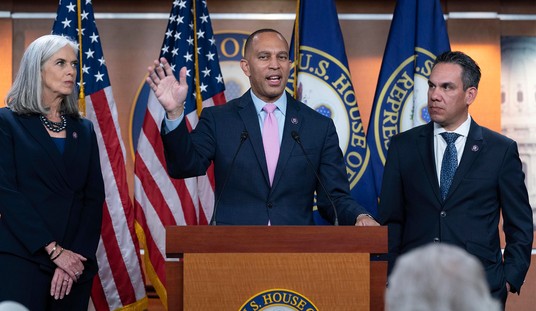Throughout the Wuhan coronavirus pandemic and shutdowns the nation’s Democrat governors have shown us just how dictatorial their aspirations are by issuing reams of overreaching executive orders they claim are allowable due to the public health emergency. California’s Gavin Newsom has been one of the worst offenders, but an order issued Friday by Sutter County Superior Court Judge Perry Parker could put a stop to a number of items on Newsom’s wish list.
Two GOP members of the California State Assembly, Kevin Kiley and James Gallagher, filed suit Thursday seeking to invalidate Newsom’s Executive Order N-67-20 pertaining to the November general election and requesting “interim declaratory relief and a temporary restraining order.” Newsom’s EO allowed counties to reduce the number of precincts on Election Day if in-person voting centers were available for at least three days prior, eliminated a requirement for county elections officials to hold publicly-noticed election planning meetings (leading to less transparency and ability for stakeholders to participate), and reinforced a prior executive order directing that each “registered (and otherwise eligible)” voter in the state receive a vote-by-mail ballot.
Friday morning Parker issued a temporary restraining order suspending implementation of the executive order, saying it was “an impermissible use of legislative powers in violation of the California Constitution and the laws of the State of California.”
Kiley and Gallagher quickly publicized their victory on Twitter.
A victory for separation of powers. The California Constitution creates a separation of powers. Today, the Courts helped put a stop to one-man rule and lawmaking. https://t.co/P46t6CwP1o
— James Gallagher (@J_GallagherAD3) June 12, 2020
Today @J_GallagherAD3 and I took Gavin Newsom to court for overstepping his powers and won a Temporary Restraining Order. The Judge ordered the Governor’s latest Exexutive Order suspended as a violation of the Constitution. To save costs, we represented ourselves. pic.twitter.com/9sTQN9fikR
— Kevin Kiley (@KevinKileyCA) June 12, 2020
The Governor's unlawful Executive Order, suspended by a court today, deprived Californians with disabilities of their statutory right to participate in election planning through a publicly noticed meeting. A legislative process will let us hear from the disability community.
— Kevin Kiley (@KevinKileyCA) June 12, 2020
The lawmakers have been vocal and constant critics of Newsom’s use of executive orders during the coronavirus pandemic, but they aren’t alone in their criticism:
Lawmakers of both political parties have criticized Newsom, a Democrat, for not sufficiently including them in his sweeping declarations and budget decisions since the pandemic began. The governor has issued more than 40 executive orders, according to a court filing by Gallagher.
They include halting evictions, delaying late fees for paying taxes or renewing drivers licenses, allowing grocery stores to once again hand out single-use bags for free — even allowing couples to be married by video or teleconference, with marriage licenses and certificates digitally signed and sent by email.
They are in a 28-page list submitted by Kiley of Newsom’s orders that alter existing state laws.
They also include allowing local and state governments to hold public telephone meetings instead of meeting in person; extending deadlines for various businesses to pay fees, file reports or renew licenses; suspending rules intended to protect patients’ medical privacy; suspending deadlines and instructional requirements for local school districts; and suspending election deadlines and procedures.
In a joint statement issued Friday, Kiley and Gallagher said:
“This is a victory for separation of powers. The governor has continued to brazenly legislate by fiat without public input and without the deliberative process provided by the Legislature. Today the judicial branch finally gave him the check that was needed and that the Constitution requires.”
While the TRO doesn’t explicitly apply to Newsom’s earlier order (Executive Order N-64-20) mandating that all voters receive vote-by-mail ballots for the general election, since the order at issue contains the same provision (though with some clarifying language), it’s likely that subject will be addressed at a full hearing on the restraining order, which is scheduled for June 26. At that time, Parker ordered Newsom to:
“[S]how cause, if any, why Defendant, his agents, employees and assigns should not be enjoined during the pendency of this action from (1) carrying out or implementing the provisions of Executive Order N-67-20 and (2) from further exercising any legislative powers in violation of the California Constitution and applicable statute, specifically from unilaterally amending, altering, or changing existing statutory law or making new statutory law.
Jesse Melgar, Newsom’s press secretary, issued a statement saying:
“Nobody should have to choose between their health and their right to vote. The action taken by the court today does not impede or impact California’s ability to move forward with the Governor’s Vote by Mail executive order. The state will continue advancing our efforts to ensure that Californians can exercise their right to vote in a safe and accessible manner during the General Election this November, including through registered voters voting by mail.”
Melgar conveniently left out the small detail that any Californian can already request a vote-by-mail ballot and avoid potential coronavirus infection or simply avoid Election Day crowds under existing law.














Join the conversation as a VIP Member